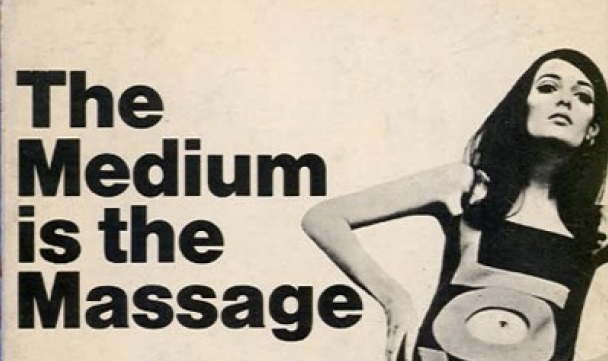
Image via Wikimedia Commons
Briefly noted: In 1967, Marshall McLuhan teamed up with graphic designer Quentin Fiore to write The Medium is the Massage, a short 160-page book that offers a condensed, effective presentation of his ideas on the nature of media, communication and technology. The book was soon accompanied by an album bearing the same name, which Wikipedia describes like this:
An audio recording based on the book was made by Columbia Records in the late 1960s, produced by John Simon but otherwise keeping the same credits as the book. The recording consists of a pastiche of statements made by McLuhan interrupted by other speakers, including people speaking in various phonations and falsettos, discordant sounds and 1960s incidental music in what could be considered a deliberate attempt to translate the disconnected images seen on TV into an audio format, resulting in the prevention of a connected stream of conscious thought. Various audio recording techniques and statements are used to illustrate the relationship between spoken, literary speech and the characteristics of electronic audio media. McLuhan biographer Philip Marchand called the recording “the 1967 equivalent of a McLuhan video.
One reviewer on Amazon describes it as “more of a performance piece than a treatise.” And thanks to Spotify, you can hear it below, in full. Also find it on YouTube.
The Medium is the Massage–yes, it was originally spelled that way–will be added to our list: 1,000 Free Audio Books: Download Great Books for Free
Related Content:
Marshall McLuhan on the Stupidest Debate in the History of Debating (1976)
The Visionary Thought of Marshall McLuhan, Introduced and Demystified by Tom Wolfe
McLuhan Said “The Medium Is The Message”; Two Pieces Of Media Decode the Famous Phrase


It was spelled that way, but McLuhan was of course riffing on his own, “the medium is the message,” posited in his 1964 book, “Understanding Media: The Extensions of Man.”
No longer available on Youtube.